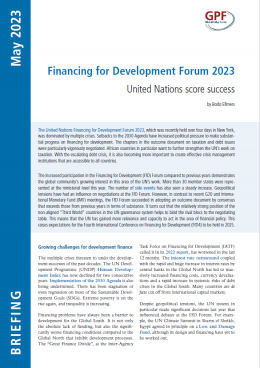The United Nations Financing for Development Forum 2023, which was recently held over four days in New York, was dominated by multiple crises. Setbacks to the 2030 Agenda have increased political pressure to make substantial progress on financing for development. The chapters in the outcome document on taxation and debt issues were particularly vigorously negotiated. African countries in particular want to further strengthen the UN’s work on taxation. With the escalating debt crisis, it is also becoming more important to create effective crisis management institutions that are accessible to all countries.
The increased participation in the Financing for Development (FfD) Forum compared to previous years demonstrates the global community’s growing interest in this area of the UN’s work. More than 30 member states were represented at the ministerial level this year. The number of side events has also seen a steady increase. Geopolitical tensions have had an influence on negotiations at the FfD Forum. However, in contrast to recent G20 and International Monetary Fund (IMF) meetings, the FfD Forum succeeded in adopting an outcome document by consensus that exceeds those from previous years in terms of substance. It turns out that the relatively strong position of the non-aligned “Third World” countries in the UN governance system helps to bind the rival blocs to the negotiating table. This means that the UN has gained more relevance and capacity to act in the area of financial policy. This raises expectations for the Fourth International Conference on Financing for Development (FfD4) to be held in 2025.

